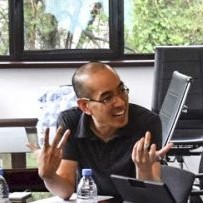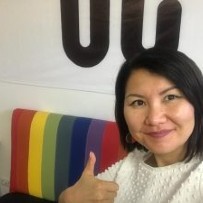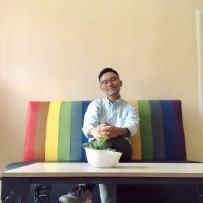#Pride in the Work: A CSSW Research Team Reflects on #PrideMonth
In celebration of #PRIDEMonth, a team of researchers at the Columbia University School of Social Work’s Social Intervention Group weighed in on how #PRIDE is reflected in their day to day research. Dr. Elwin Wu, Gulnara Zhakupova, and Yong Gun “YG” Lee, all help manage and oversee a project called “UNI” based out of Columbia’s Global Health Research Center in Central Asia.
UNI is a social network-based intervention in Kazakhstan designed to engage stigmatized communities through social networks, in particular men who have sex with men. Kazakhstan is one of the nine countries in the world that saw a greater than 25% increase in HIV incidence in the first decade of this century. The burden of the epidemic has fallen disproportionately on vulnerable populations including injection drug users and men who have sex with men.
The networks UNI helps create allow men to share and promote health within their personal social networks. The men themselves are experts in how and from whom to find safe, compassionate care, and will collaboratively explore ways of sharing their knowledge with others. Among other activities, UNI facilitates a discussion group for these stigmatized men.
One group participant reported that “I learned important information about my own rights when I am walking on the street or meeting my friends at a private place that I never knew before.”
In addition to UNI’s mission and research activities, PRIDE is well reflected in the spaces that the project occupies. By incorporating the colors of PRIDE in its field offices, UNI has created an environment that is inviting and inclusive. Here, in the offices, UNI has hosted several community gatherings such as movie nights and discussion clubs. The Rainbow Sofa, the signature furniture piece that takes center stage in all UNI field offices, was introduced by UNI’s very own Project Coordinator, Vitaliy Vinogradov, and enjoyed by everyone.

Dr. Elwin Wu is the primary investigator for UNI, co-Director of the CSSW-based Social Intervention Group, and a research scientist and professor at the Columbia University School of Social Work. Elwin focuses his research on marginalized individuals and communities, including sexual minorities like himself.
In what ways does your research reflect PRIDE?
“Though my research has been focused on preventing HIV and facilitating linkages to care, the PRIDE in my research is more around issues of equity, equal treatment, and reducing discrimination. The interventions I design and test are all about social well-being.
“For example, if we treat a black male couple and say ‘We want to improve your relationship and build more trust’ and ‘We want you to be proud to be with one another and have the exact same support for your relationship and services as hetero couples,’ I strongly believe their health problems will take care of themselves.”
How would PRIDE improve their health outcomes?
“Rather than a culture of shame and hiding, where HIV flourishes unabated, a culture of celebration and PRIDE allows open dialogue and therefore linkages to the preventative tools and treatments needed in the community. This is how PRIDE comes into my research.”

Gulnara Zhakupova, Project Director for UNI at the Global Health Research Center of Central Asia, is a strong ally of the LGBTQ community and has been instrumental in bridging the gap between research and diverse communities.
In what ways does your research reflect PRIDE?
“The UNI research project will involve up to 1400 men who have sex with men in three of the largest cities in Kazakhstan for free HIV and STI testing. The project will also provide intervention that will be focused on effective use of social media to engage peers in health issues. This is the first research project with the LGBTQ population that engages over 1000 persons in the history of my country. I am so proud to be part of it. This is my PRIDE!!!”
Of UNI’s discussion group in Skymkent, a city in Kazakhstan, she says:
“I was truly excited that the community of men who have sex with men in Shymkent is getting larger and more active. Due to outreach by the UNI team, more and more gay men in Shymkent feel that there is place where they can feel safe and can be accepted by others.”

Yong Gun (“YG”) Lee, a doctoral student at CSSW, is the Project Coordinator for the UNI research project, coordinating research activities including (to-date) intervention mapping and development, staff support and training, and data collection & management development. Prior to this program, YG was a AGPP MSW student at CSSW, supporting research activities including HIV test counseling and behavioral assessment interviews.
In what ways does your research reflect PRIDE?
“PRIDE, to me, is about celebrating diversity in humanity and promoting equality in global society. I believe that UNI reflects PRIDE by centralizing and advocating Kazakhstan’s socially marginalized people, whose direct involvement in all aspects of the project, in turn, would contribute to advancing scientific knowledge of, hence clinical competency in, global sexual- and gender-minority health.”
Photos were contributed by Karina Alipova, UNI Site Coordinator for Shymkent (Shymkent photos), Gulnara Zhakupova, UNI Project Director (Almaty photos), and YG (Astana photos).